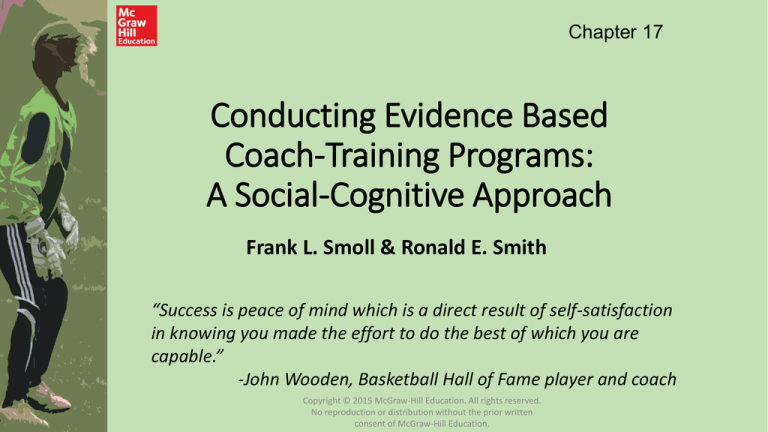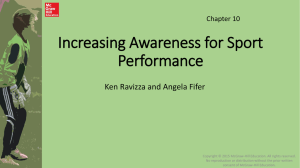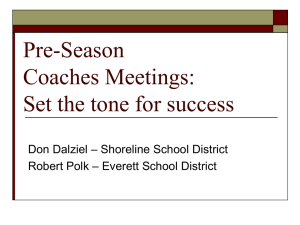
Chapter 17
Conducting Evidence Based
Coach-Training Programs:
A Social-Cognitive Approach
Frank L. Smoll & Ronald E. Smith
“Success is peace of mind which is a direct result of self-satisfaction
in knowing you made the effort to do the best of which you are
capable.”
-John Wooden, Basketball Hall of Fame player and coach
Copyright © 2015 McGraw-Hill Education. All rights reserved.
No reproduction or distribution without the prior written
consent of McGraw-Hill Education.
Coaches and Sport Psychologists
Need Coaching, Too!
• All interventions should be based on
firm empirical evidence and should
have demonstrated efficacy based
on outcome research
• Coaches and sport psychologists
need to work together
Copyright © 2015 McGraw-Hill Education. All rights reserved. No
reproduction or distribution without the prior written consent of
McGraw-Hill Education.
Theoretical Model and Research Paradigm
• Cognitive-mediational model of coach-athlete interactions:
COACH BEHAVIORS
ATHLETES’ PERCEPTIONS AND RECALL
ATHLETES’ EVALUATIVE REACTIONS
Copyright © 2015 McGraw-Hill Education. All rights reserved. No
reproduction or distribution without the prior written consent of
McGraw-Hill Education.
Cognitive-Mediational Model of
Coach-athlete Interactions
• Coaching behaviors are mediated by the
athletes’ recall and the meaning they
attribute to the coach’s actions
• Also influenced by:
• Athlete’s age
• What he or she expects of coaches
• Personality variables such as selfesteem and anxiety
Copyright © 2015 McGraw-Hill Education. All rights reserved. No
reproduction or distribution without the prior written consent of
McGraw-Hill Education.
Measurement of Coaching Behavior
• Coaching Behavior Assessment System (CBAS)
• Measures leadership behaviors
• Direct observation and coding of coaches’
actions during practices and games
• Two major classes of behaviors
• Reactive
• Responses to immediately preceding athlete
or team behaviors
• Spontaneous
• Not a response to a discernible preceding
event
Copyright © 2015 McGraw-Hill Education. All rights reserved. No
reproduction or distribution without the prior written consent of
McGraw-Hill Education.
Testing CBAS
• How frequently do coaches engage
in behaviors such as
encouragement, punishment,
instruction, and organization, and
how are observable coaching
behaviors related to children’s
reactions to their organized athletic
experiences?
Copyright © 2015 McGraw-Hill Education. All rights reserved. No
reproduction or distribution without the prior written consent of
McGraw-Hill Education.
Testing CBAS (cont.)
• CBAS systematic program of research was carried out
over a period of several years
• Evaluated how frequently coaches engage in
reactive and spontaneous behaviors
• Evaluated children’s reactions to these
behaviors and their organized athletic
experience
Copyright © 2015 McGraw-Hill Education. All rights reserved. No
reproduction or distribution without the prior written consent of
McGraw-Hill Education.
Testing CBAS (cont.)
• Typical baseball or basketball coach engages in more than 200
codable actions during an average game
• Most positive outcomes occurred when children played for
coaches who:
• Engaged in high levels of positive reinforcement
(performance and effort)
• Responded to mistakes with encouragement and technical
instruction
• Emphasized the importance of fun and personal
improvement over winning.
Copyright © 2015 McGraw-Hill Education. All rights reserved. No
reproduction or distribution without the prior written consent of
McGraw-Hill Education.
Testing CBAS (cont.)
• A positive coaching climate was 10 times more influential than
was the team’s win-loss record
• Coaches unaware of how they behaved
• Athletes were more accurate perceivers of actual coach
behaviors
Copyright © 2015 McGraw-Hill Education. All rights reserved. No
reproduction or distribution without the prior written consent of
McGraw-Hill Education.
Assessing the Efficacy of a CoachTraining Program
• Coach Effectiveness Training (CET) Workshops
• Cognitive-behavioral framework
• Designed to train coaches to provide a more positive and
socially supportive athletic environment
• Coaches instructed on behavioral guidelines
• Behavioral feedback and self-monitoring procedures
employed to increase the coaches’ self-awareness
• Trained CBAS observers came to 2 complete games
• ALSO measure postseason outcomes with players
Copyright © 2015 McGraw-Hill Education. All rights reserved. No
reproduction or distribution without the prior written consent of
McGraw-Hill Education.
Assessing the Efficacy of a Coach-Training
Program (cont.)
• Observers and players found that the trained coaches were
different than those not trained in CBAS.
• CBAS coaches:
• Gave more reinforcement in response to good
performance and effort
• Responded to mistakes with more encouragement and
technical instruction and fewer punitive responses
• Better liked and perceived as better teachers
• Players liked one another more, had greater enjoyment,
and showed increases in general self-esteem
• No won-loss differences
Copyright © 2015 McGraw-Hill Education. All rights reserved. No
reproduction or distribution without the prior written consent of
McGraw-Hill Education.
Assessing the Efficacy of a
Coach-Training Program (cont.)
• CET intervention resulted in player-perceived behavioral differences
between trained and untrained coaches
• Trained coaches were better liked and rated as better teachers; players
reported more fun playing
• Children with low self-esteem who played for the trained coaches
exhibited a significant increase in general self-esteem over the course
of the season
• Children experienced lower levels of performance anxiety with CET
coaches
Copyright © 2015 McGraw-Hill Education. All rights reserved. No
reproduction or distribution without the prior written consent of
McGraw-Hill Education.
Replication of the Efficacy of a CoachTraining Program
Four results for trained vs. untrained coaches:
1. Player-perceived behavioral differences were consistent with
the behavioral guidelines
2. Coaches were better liked and rated as better teachers by
their players
3. Children with low self-esteem exhibited a significant increase
in general self-esteem
4. Children manifested lower levels of performance anxiety
One year follow-up found drop-out difference:
– control group = 26% dropout rate
– trained group = 5% dropout rate
Copyright © 2015 McGraw-Hill Education. All rights reserved. No
reproduction or distribution without the prior written consent of
McGraw-Hill Education.
Achievement Goals, Motivational
Climate, and Coaching
• Sport environment is inherently a
competence and achievement
context
• Motivational factors play an
important role in determining the
effects of participation on
psychosocial development
Copyright © 2015 McGraw-Hill Education. All rights reserved. No
reproduction or distribution without the prior written consent of
McGraw-Hill Education.
Achievement Goal Theory
• Focuses on understanding the function and the
meaning of goal directed action, based on athletes
perception of ability and demonstrated competence
• Incorporates a variety of variables:
•
•
•
•
•
•
•
Goal states
Attributions
Fear of failure
Self-perceived competence
Incremental and entity implicit theories of competence
Goal orientations
Motivational climate
Copyright © 2015 McGraw-Hill Education. All rights reserved. No
reproduction or distribution without the prior written consent of
McGraw-Hill Education.
Goal Orientation
• The criteria individuals use to define
success
• Mastery (task) – Success = selfreferenced manner and is focused on
skill development, task mastery, and
exerting maximum effort
• Ego – Social comparison shapes selfperceived success, emphasis is on
outperforming others in order to attain
recognition and status.
Copyright © 2015 McGraw-Hill Education. All rights reserved. No
reproduction or distribution without the prior written consent of
McGraw-Hill Education.
Motivational Climate
• Achievement behavior influenced by
both personal and situational factors.
• Motivational climate = environmental
factors that foster mastery or ego
involvement.
• Mastery Climate
• Success is defined in terms of selfimprovement, task mastery and
exerting maximum effort
• Ego-involving Climate
• Success is defined in terms of
social comparison
Copyright © 2015 McGraw-Hill Education. All rights reserved. No
reproduction or distribution without the prior written consent of
McGraw-Hill Education.
Motivational Climate (cont.)
Mastery Climate
Ego-involving Climate
• Stronger mastery orientation
for participants
• Greater enjoyment and
satisfaction
• Stronger intrinsic and selfdetermination motivation
• Group cohesion
• Lower levels of performance
anxiety
• Positive reinforcement only
given to most competent
athletes and instrumental to
winning
• Comparing teammates creates
rivalries
• Mistakes punished with criticism
(inspiring a fear of failure with
athletes)
• Win at all costs (negative effects)
Copyright © 2015 McGraw-Hill Education. All rights reserved.
No reproduction or distribution without the prior written
consent of McGraw-Hill Education.
Mastery Approach to Coaching
• MAC incorporates content on goal orientations
and motivational climate and provides specific
guidelines on creating a mastery climate
• Coaches are encouraged to increase:
1. Positive reinforcement
2. Mistake-contingent encouragement
3. Corrective instruction given in a positive
and encouraging fashion
4. Sound technical instruction
Copyright © 2015 McGraw-Hill Education. All rights reserved. No
reproduction or distribution without the prior written consent of
McGraw-Hill Education.
MAC (cont.)
• Coaches urged to avoid:
• Non-reinforcement of positive behaviors
• Punishment for mistakes
• Punitive technical instruction following
mistakes
• Guidelines are designed to:
•
•
•
•
•
Reduce fear of failure
Foster self-esteem
Increase positive coach-athlete interactions
Enhance team solidarity
Promote positive atmosphere for skill
development
Copyright © 2015 McGraw-Hill Education. All rights reserved.
No reproduction or distribution without the prior written
consent of McGraw-Hill Education.
Implementing Sport Psychology
Workshops for Coaches
Create a positive learning experience
• Do:
• Don’t:
– Communicate respect
– Emphasize that all
coaches have a great
deal to offer as a result
of their own experiences
– Convey sincere
enthusiasm
– Approach coaches in
condescending manner
– Intimate that the
program is designed to
protect athletes from
coaches
– Give the impression that
what the coaches have
been doing is incorrect
Copyright © 2015 McGraw-Hill Education. All rights reserved. No
reproduction or distribution without the prior written consent of
McGraw-Hill Education.
Workshops for Coaches (cont.)
•
Coaches should be made aware of their important role
as a coach
•
Many underestimate their influence and need reminding of their effect on
young athletes
•
Teach a 4-part philosophy of winning
1. Winning isn’t everything, nor is it the only thing
2. Failure is not the same thing as losing
3. Success is not equivalent to winning
4. Success is found in striving for victory
• Maximizes young athletes’ enjoyment of sport and the
benefits of participation
Copyright © 2015 McGraw-Hill Education. All rights reserved. No
reproduction or distribution without the prior written consent of
McGraw-Hill Education.
Workshops for Coaches (cont.)
• Establishing an empirical foundation for training guidelines
+ presenting supportive, empirical evidence
• Expertise and trustworthiness
• Arouses the curiosity and involvement of participants
• Research findings form a frame of reference for the
behavioral guidelines
• Demonstrating that certain behaviors have positive
effects on children impact coaches’ expectations for
similar consequences
• Use lay terms and visual aids, avoid scientific jargon
Copyright © 2015 McGraw-Hill Education. All rights reserved. No
reproduction or distribution without the prior written consent of
McGraw-Hill Education.
Workshops for Coaches (cont.)
• Do not view as a “magic formula” and mere knowledge of
the principles are not sufficient
• Must integrate the guidelines into his/her own coaching
style
• Interactive format to encourage active participatory
learning (stories and anecdotes)
• Trainer must be well versed in practical ramifications of
the guidelines
Copyright © 2015 McGraw-Hill Education. All rights reserved. No
reproduction or distribution without the prior written consent of
McGraw-Hill Education.
Secrets of Effective Presentations
• Prepare, prepare, prepare
• More comfortable when practice presenting
before the session
• Find your style
• Do what feels right
• Spice it up
• Include personal and interesting sport stories
• Cover less, not more
• Go slowly and thoughtfully through the material
• Make improvements
• Avoid doing the same thing over and over, even
though it is
not
working
Copyright © 2015 McGraw-Hill Education. All rights reserved. No
reproduction or distribution without the prior written consent of
McGraw-Hill Education.
Goal of the Workshop
• Change coaches’ attitudes about some of
their roles and responsibilities and about
their use of certain coaching behaviors
• The persuasion process involves:
• Credibility, trustworthiness, likeability,
and novelty
Copyright © 2015 McGraw-Hill Education. All rights reserved. No
reproduction or distribution without the prior written consent of
McGraw-Hill Education.
Credibility
Persuasiveness
• A credible
communicator is more
effective in changing
attitudes
• Credibility = Expertise +
Trustworthiness
• Present information and
coaching guidelines
objectively - avoid a
“right versus wrong”
• Create similarities to
create persuasiveness –
“we” vs. “you”
• Communicator’s liability
• Reciprocity
• 2-sided presentation
• Rhetorical questions
• Novelty
• Humor
Copyright © 2015 McGraw-Hill Education. All rights reserved.
No reproduction or distribution without the prior written
consent of McGraw-Hill Education.
Increase Coaches’ Self-Awareness and
Compliance
• Behavioral feedback
• Encouraged coaches to work with their assistants
and share descriptions of each other behaviors
and solicit feedback from athletes
• Self-monitoring
• Manual contains a self-monitoring form to be filled
out immediately after practices/games
Copyright © 2015 McGraw-Hill Education. All rights reserved. No
reproduction or distribution without the prior written consent of
McGraw-Hill Education.








